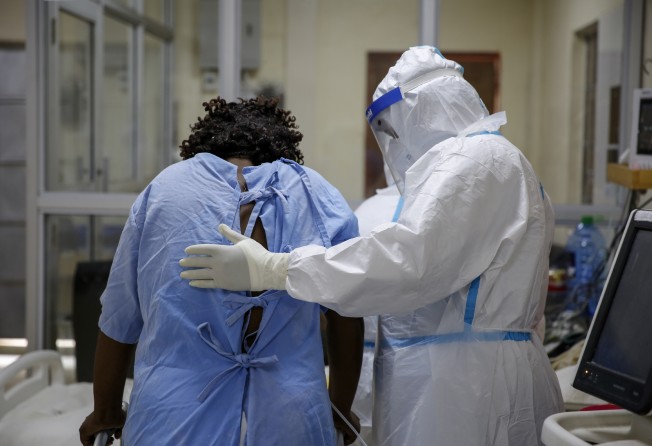
03:14
US coronavirus death toll hits record 250,000 after highest daily fatalities in months

The World Health Organization recommended against using Gilead’s remdesivir to treat hospitalised Covid-19 patients less than a month after US regulators granted the drug a speedy approval.
“There is currently no evidence that it improves survival or the need for ventilation,” a panel of WHO-convened experts developing Covid-19 treatment guidelines said in the BMJ medical journal.
The recommendation is a blow to Gilead’s drug, which was one of the first thought to offer a meaningful benefit in treatment of coronavirus patients after a study showed it reduced their recovery time. The antiviral has been used widely to treat Covid and was among the drugs President Donald Trump received when he was diagnosed with the disease in early October.
The experts made the recommendation after the results of a global trial sponsored by the WHO, called Solidarity, found last month that remdesivir didn’t reduce deaths. They also reviewed data from three other trials and said the drug “has no meaningful effect” on the time it took patients to clinically improve.
The results were published October 15. The US Food and Drug Administration approved the drug a week later, basing its decision on a trial run by the National Institutes of Health that showed remdesivir reduced hospitalised patients’ recovery time by five days.

03:14
US coronavirus death toll hits record 250,000 after highest daily fatalities in months
Gilead has questioned the results of WHO’s trial and said the agency still has not released key data to allow the company or others to evaluate the reliability of the interim results.
Multiple studies published in peer-reviewed journals have show remdesivir, also known by its brand name, Veklury, is beneficial against the virus, particularly in improving recovery time, “which can free up limited hospital resources,” Gilead said in a statement Thursday.
“We are disappointed the WHO guidelines appear to ignore this evidence at a time when cases are dramatically increasing around the world and doctors are relying on Veklury as the first and only approved antiviral treatment for patients with Covid-19 in approximately 50 countries,” according to the statement.
Despite the discordance with the WHO, the FDA said in its review of remdesivir that “there were no issues identified that would benefit from discussion” by a panel of outside advisers. FDA typically convenes such a panel before deciding whether to approve a drug in situations where there are questions arising from clinical trial data.
The FDA originally granted emergency use authorisation to remdesivir in May. Gilead requested full FDA approval in August. The European Commission granted the drug conditional authorisation in July based on the US-led clinical trial.

Other countries have also approved remdesivir as a treatment for Covid. Japan’s chief cabinet secretary, Katsunobu Kato, said Friday there’s no need for the nation, which gave its nod in May, to review remdesivir’s approval at this time. Zhong Nanshan, a Chinese expert on infectious disease, said at a conference in Zhuhai that remdesivir isn’t “entirely useless”, citing shortened hospital stays among mild patients in the US.
The WHO experts wrote in the BMJ that their findings shouldn’t be interpreted to mean that remdesivir is ineffective, but that “there is no evidence based on currently available data that it does improve patient-important outcomes”.
The limited evidence for using the drug was weighed alongside the “relatively high cost and resource implications associated with remdesivir”, which is given intravenously, they said in a press release.
The FDA was earlier criticised for hastily authorising an antimalarial drug, hydroxychloroquine, to treat Covid-19. Trump repeatedly touted the drug early in the pandemic, though medical evidence was lacking to support his claims. The FDA then revoked its authorisation after hydroxychloroquine was shown not to combat the virus and was linked to harmful side effects.
Additional reporting by Reuters